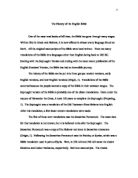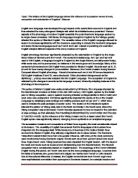John Purvey, a follower of Wycliffe’s, made a revision of Wycliffe’s Bible, making it easier to read (Languages, 3). Here is an example of the revisions taken from Hebrews 1 Wycliffe’s version read, “Manifold and many manners sometimes God speaking to fathers in prophets, at the last in these days spake to us in the Son, whom he ordained heir of all things, by whom he made the worlds,” (McAfee, 1) while Purvey’s version read, “God, that spake sometime by prophets in many manners to our fathers, at last in these days he hath spoke to us by the Son, whom he hath ordained heir of all things, and by whom he made the worlds” (McAfee, 2). Even with the revisions, this version was also hard for people to understand.
In 1450, a man named Johann Gutenburg invented the printing press. The first book ever printed was the Bible and it was printed in Latin. With the ability of printing the Bible rather than hand writing it, more people were reading and learning the Word of God. Copies of the English Bible were printed as well, but they were illegal (History2, 1).
Following the invention of the printing press, a man named William Tyndale decided to make another English translation. His version, published in 1526 was a much more understandable version than that of Purvey’s. Purvey’s version of Hebrews 1 read as follows. “God in time past diversely and many ways spake unto the fathers by prophets: but in these last days he hath spoken unto us by his Son, whom he hath made heir of all things: by whom also he made the world” (McAfee, 3). Though it is not as literal of a translation as Wycliffe’s translation, it is literal by our modern standards. After his version of the New Testament was printed, Tyndale proceeded to translate the Old Testament. However, he was only able to complete the Pentateuch before he was killed by Roman Catholics.
Following Tyndale’s translation, a man named Miles Coverdale printed the first complete Bible in English (Language, 4). Since Coverdale did not know Hebrew or Greek, he relied on the Vulgate and Martin Luther’s German translation while he made his own version of the English Bible. He also made some revisions to Tyndale’s translation. “God in time past diversely and many ways spake unto the fathers the prophets, but in these last days he has spoken unto us by his Son, whom he hath made heir of all things, by whom also he made the world (McAfee, 4). Coverdale’s translation is responsible for the literary quality of the English Bible. The second complete English Bible to be printed was done so by John Rogers, under the name Thomas Matthew. His Bible, known as Matthew’s Bible, was written using the works of Tyndale and Coverdale.
The next major accomplishment in the Bible’s history was the publication of the Great Bible. The Great Bible, which was based on the Tyndale, Coverdale, and Matthews Bibles, was commissioned by Thomas Cramer, the Archbishop of Canterbury (History1, 2). “God in time past diversely and many ways spake unto the fathers by prophets, but in these last days he hath spoken unto us by his own Son, whom he hath made heir of all things, by whom also he made the world” (McAfee, 5). The first few editions of the Bible that were offered in English were illegal. The Great Bible became the first authorized edition of the English Bible (History1, 2).
Following the Great Bible was the Geneva Bible. Faced with persecution during the reign of Queen Mary, many English Puritans fled to Geneva for safety. While there, the Geneva Bible was written. The men who wrote it knew Greek and Hebrew, and using earlier English editions, were able to produce an accurate version of the Bible. The Geneva’s Hebrews 1 version reads as follows. “1 At sundry times and in diverse manners God spake in the old time to our fathers by the prophets: 2 In these last days he hath spoken unto us by his Son, whom he hath made heir of all things, by whom also he made the worlds,” (McAfee, 6). The Geneva Bible was the first Bible to separate the chapters into versus, making it easier to reference.
The Bishop’s Bible was the next to be published. Commissioned under the reign of Elizabeth in England, the Bishops’ Bible was a revision of the Great Bible and the Geneva Bible (Origin 3). Also containing versus, its passage reads as follows. “1 God, which in the time past, at sundry times and in diverse manners, spake unto the fathers in the prophets, 2 hath in these last days spoken unto us in the Son, whom he hath appointed heir of all things, by whom also he made the worlds” (McAfee, 7). The Bishops’ Bible was not well accepted, but it did become the version read in England church services.
The next major production, the “translation to end all translations” was the King James Bible (History2, 4). The translation became the most popular translation ever. It had improvements upon its appearance that made it even easier to reference, separating each verse into a new paragraph.
“1 God, who at sundry times and in diverse manners spake unto the fathers by the prophets,
2 Hath in these last days spoken unto us by his Son, whom he hath appointed heir of all things, by whom also he made the worlds,” (McAfee, 7).
The King James Bible was and still remains the most popular version of the Bible.
The King James Version remained the most popular for about 270 years (Wallace, 2). There are many reasons for this. One reason is because the King James Version was produced in England, whereas the Geneva was not. It was also available in more than one size, making it attainable for the church or the home. The King James Version was written in excellent English. One final reason that the King James Version remained on top for so long is that it had political and financial backing from the throne (Wallace, 3). In the 1800’s, the Revised Edition of the King James Version was printed, breaking the 270 year reign of the King James Version.
There were a few notable versions that followed the Revised Edition. The first, published in 1901, was the American Standard Version. The Hebrews passage from the American Standard Version is as follows. “1 God, having of old time spoken unto the fathers in the prophets by divers portions and in divers manners, 2 hath at the end of these days spoken unto us in [his] Son, whom he appointed heir of all things, through whom also he made the worlds;” (Hebrews, 5).
Following the American Standard Version was the Revised Standard Version. The Revised Standard Version is considered more accurate than the American Standard Version because more Hebrew and Greek manuscripts were available (Origin, 3). Here is the excerpt from Hebrews 1. “1 In many and various ways God spoke of old to our fathers by the prophets; 2 but in these last days he has spoken to us by a Son, whom he appointed the heir of all things, through whom also he created the world” (Hebrews, 6). The Revised Standard Version is used in most Protestant churches today.
After these last few versions, many followed. In 1973, the popular New International Version was published. Hebrews 1 reads “1 In the past God spoke to our forefathers through the prophets at many times and in various ways, 2 but in these last days he has spoken to us by his Son, whom he appointed heir of all things, and through whom he made the universe” (Hebrews, 8). After this came the New King James Version, the New Revised Standard Version, and the New Living Translation. The most recent version of the English Bible is the English Standard Version, published in 2001 (Hebrews, 10).
The Bible’s written history dates back before 285 BC. Taken from its original texts of Hebrew and Greek, the Bible has undergone many revisions. In its Greek translation,“1πολυμερως και πολυτροπως παλαι ο θεος λαλησας τοις πατρασιν εν τοις προφηταις 2 επ εσχατου των ημερων τουτων ελαλησεν ημιν εν υιω, ον εθηκεν κληρονομον παντων, δι ου και εποιησεν τους αιωνας:” is what Hebrews 1 looks like (Hebrews, 1). In its most modern version, Hebrews 1 is read as “1 Long ago, at many times and in many ways, God spoke to our fathers by the prophets, 2 but in these last days he has spoken to us by his Son, whom he appointed the heir of all things, through whom also he created the world” (Hebrews, 10). Changing from Greek and Hebrew into Latin, English, and countless other languages, the Bible remains one of the most read books in the world.
Works Cited
“Hebrews 1:1-4 in Many Versions.” Retrieved April 4, 2003. http://www.bible-researcher.com/many.html
“The History of the English Bible.” Retrieved January 22, 2003. http”//www.giveshare.org/BibleStudy/202.historyenglishbible.html
“The History of the English Bible.” Retrieved January 23, 2003. http://www.greatsite.com/engbibhis/
“The History of the English Bible.” Retrieved January 22, 2003. http://www.omegapage.com/foundations/Translating/english_bible_history.htm
“Languages of the Bible.” Retrieved January 22, 2003. http://www.geocities.com/Heartland/Hills/9959/biblehistory.html
McAfee, Cleland Boyd. “Early English Bibles.” Retrieved March 26, 2003. http://www.bible-researcher.com/canon9.html
“The Origin and Development of the English Language Bible.” Retrieved March 26, 2003. http://www.ssquare.com/SacredBooksMusic/htm/bibledoc.htm
“Preparing the Way: The English Bible Before King James.” Retrieved March 26, 2003. http://www.bible-researcher.com/mcafee1.html
Wallace, Daniel B. “The History of the English Bible.” March 21, 2001. Retrieved January 23, 2003. http://www.bible.org/docs/soapbox/KJVtoRV.htm







